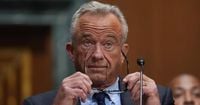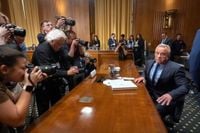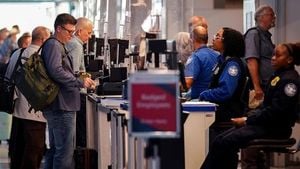It’s not every day that the Kennedy family, one of America’s most storied political dynasties, finds itself in open revolt against one of its own. Yet this past week, the rift within the Kennedy clan burst into full public view, as multiple members called for Robert F. Kennedy Jr. to resign from his post as Secretary of Health and Human Services. Their demands, echoed by former Trump administration officials and a chorus of lawmakers from both parties, have thrown a spotlight on a deepening crisis at the heart of the nation’s public health system.
The immediate catalyst was a contentious, three-hour Senate hearing on September 5, 2025. Kennedy, a longtime leader in the anti-vaccine movement and now the top health official in President Trump’s cabinet, faced bipartisan grilling over his tumultuous leadership of federal health agencies. Senators pressed him on a series of sweeping—and, for many, alarming—changes he has made since taking office just seven months ago.
In the aftermath, the family’s response was swift and scathing. On September 6, Kerry Kennedy, the secretary’s sister and president of Robert F. Kennedy Human Rights, issued a statement accusing her brother of “undermining trust in science” and “endangering lives” with his restrictive vaccine policies. “This is not what our father stood for,” she declared, urging him to “step down before more harm is done,” according to The Associated Press.
Her nephew, former Congressman Joseph P. Kennedy III, was equally blunt. “Robert F. Kennedy Jr. is a threat to the health and wellbeing of every American,” he posted on X (formerly Twitter). “None of us will be spared the pain he is inflicting.” Their public rebuke was joined by Jack Schlossberg, grandson of President John F. Kennedy, who used even sharper language on social media, calling RFK Jr. “a threat to public health and American scientific leadership.”
This isn’t the first time the Kennedy family has taken issue with Robert Jr.’s positions. Several relatives objected to his previous presidential run, and others wrote to senators earlier this year, urging them to reject his nomination as health secretary due to what they considered disqualifying views on life-saving vaccines. But the latest statements mark a new level of urgency and personal anguish, reflecting the stakes of his current role.
The Senate hearing itself was a spectacle. Kennedy was repeatedly challenged about his decision to roll back COVID-19 vaccine recommendations, fire high-level officials at the Centers for Disease Control and Prevention (CDC), and dismiss respected medical organizations as “corrupt” or “conflicted.” Senator Ron Wyden accused him of “lying to the Senate Finance Committee about hugely important questions like vaccines.” Even Republican Senator Bill Cassidy, who had been instrumental in Kennedy’s confirmation, expressed concern: “We’re denying people access to vaccines.”
Since taking office, Kennedy has implemented dramatic changes across the Department of Health and Human Services (HHS). In June, he fired all 17 members of the CDC’s Advisory Committee on Immunization Practices, replacing them with vaccine skeptics and individuals tied to lawsuits against vaccine manufacturers. This move was condemned by the American Academy of Pediatrics, which warned that children’s health was being politicized at the expense of science. The firing of CDC Director Dr. Susan Monarez, just a month after her confirmation, triggered a cascade of resignations among senior CDC officials, including the chief medical officer, director of immunization, and director of emerging diseases.
Perhaps most controversially, Kennedy rolled back access to COVID-19 vaccines, limiting eligibility for boosters to those over 65—despite earlier promises not to restrict availability. Critics say this change effectively blocks younger, healthy Americans from obtaining vaccines at pharmacies or through insurance coverage. At the same time, he canceled $500 million in vaccine research funding at the Veterans Administration, raising concerns about America’s preparedness for future pandemics.
During the hearing, Kennedy praised President Trump’s Operation Warp Speed initiative, calling it “genius” and agreeing that Trump deserved a Nobel Prize for rapidly developing COVID-19 vaccines. But senators quickly pointed out the contradiction between this praise and Kennedy’s actions to cut mRNA vaccine research and restrict access to the very vaccines produced by the program. “It just seems inconsistent that you would agree with me that the president deserves tremendous amount of credit for this,” Cassidy remarked, highlighting Kennedy’s previous legal challenges to COVID vaccine access.
Throughout the hearing, Kennedy made a series of controversial statements that drew immediate fact-checking. He claimed there was “no clinical data” supporting COVID vaccine recommendations for healthy people and refused to acknowledge that more than one million Americans had died from COVID-19. When pressed about vaccine efficacy and death toll data, Kennedy argued the CDC’s information was unreliable due to “data chaos.” He also reiterated discredited claims linking vaccines to autism, specifically stating that Black boys receiving the measles, mumps, and rubella vaccine face heightened autism risk—a claim based on retracted, manipulated data.
Beyond vaccines, Kennedy has threatened physicians who deviate from his department’s new guidelines and forced out senior CDC officials who resisted his directives. Lawmakers and medical leaders warn that these policies could weaken America’s public health infrastructure for decades. By sidelining experts and undermining trusted medical institutions, critics argue, his agenda risks lowering vaccination rates, exacerbating chronic disease, and eroding public confidence in science-based health policy.
The backlash has not been limited to Washington. In response to Kennedy’s actions, the governors of Oregon, Washington, and California announced they are forming a regional health organization to align policies with the American Academy of Pediatrics and the American College of Obstetricians and Gynecologists, rather than HHS under Kennedy. Lawmakers in several Northeastern states have expressed interest in exploring similar partnerships if federal credibility continues to erode. The creation of such alliances could deepen divisions in national health policy, leaving Americans with uneven access to vaccines, maternal health care, and pediatric standards depending on where they live.
Despite the bipartisan criticism and family pressure, President Trump has stood firmly behind Kennedy following the hearing. Speaking to reporters Thursday evening, Trump said he “heard [Kennedy] did very well today” and praised his unconventional approach. “I like the fact that he’s different,” the president said, characterizing Kennedy’s positions as “a tough stance” and hailing Operation Warp Speed as “one of the greatest achievements ever.”
As the controversy rages on, the fate of Robert F. Kennedy Jr.’s tenure as Secretary of Health and Human Services remains uncertain. What is clear is that his policies have not only divided lawmakers and medical experts but have also fractured one of America’s most famous families, with consequences that could reverberate far beyond the Beltway.





